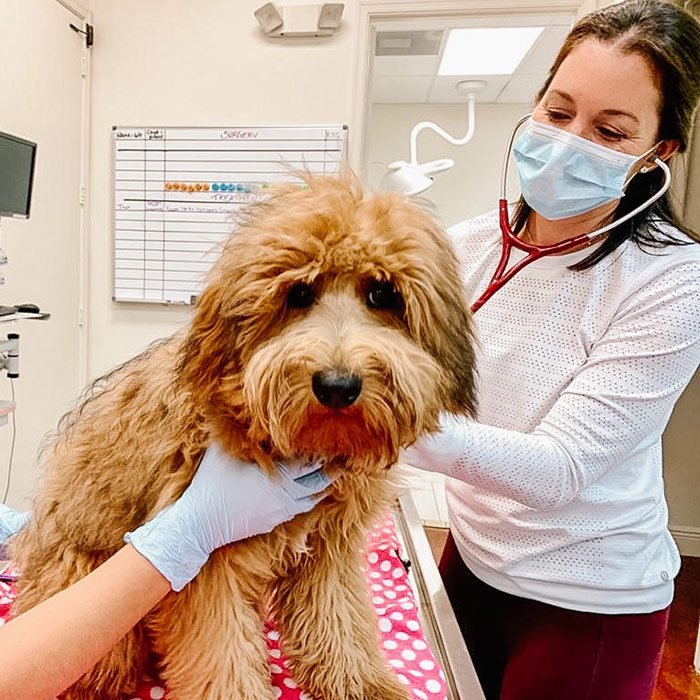
Your Pets and COVID-19: A Veterinarian’s Thoughts
With all the fear and uncertainty in our world right now, I wanted to take a moment to discuss the most updated information regarding other species of animals, namely our pets, and COVID-19.
Current data shows it is very unlikely, if not impossible, for pets to transmit COVID-19 to humans.
But to ease any lingering fears and uncertainties, I want to answer your most pressing questions regarding your pets and the virus.
What You Need to Know About Your Pets and COVID-19
Recently, news outlets across the world reported that several big cats at the Bronx Zoo are showing symptoms associated with COVID-19. One tiger tested positive for the novel coronavirus.
Understandably, people are concerned about their pets or other animals carrying or passing along the disease.
So let’s start with some of your most pressing questions.
What is COVID-19, and where did it come from?
Coronaviruses are a diverse group of viruses that have adapted to infect many animal species, including humans, birds, cats, dogs, pigs, mice, horses, whales, monkeys, ferrets, camels, and cows. There are hundreds of known coronavirus strains. These strains are grouped into different subgroups according to what species they infect. Alpha and beta subgroups infect mammals. Gamma and delta subgroups mainly infect birds.
Most of the time, the virus stays within its subgroup and does not infect other species. However, if the virus mutates (changes), it may be able to jump species. If the mutated virus is able to replicate to high enough numbers inside the new host, it will result in illness, and in the case of COVID-19, an outbreak.
Seven known coronaviruses infect people. Four of these are endemic to specific regions of the world and result in minor symptoms like the common cold.
Three of the seven coronaviruses that afflict humans have evolved within the last 20 years and have caused serious illness in people. These viruses are SARS-CoV, MERS-CoV, and most recently, SARS-CoV-2 (the virus that causes COVID-19).
Many experts believe all three of these coronaviruses (SARS-CoV, MERS-CoV and, SARS-CoV-2) came from infected bats. Bats’ specially adapted immune systems enable them to carry coronaviruses without becoming sick. Bats may then pass the virus to intermediate animals common in Chinese markets, such as palm civets, raccoon dogs, or even humans.
Have any other species of animals, besides humans, been confirmed with positive COVID-19 results?
Since February, four household pets have tested positive for SARS-CoV-2, the coronavirus causing the current pandemic. Two dogs in Hong Kong tested positive for the novel coronavirus but did not exhibit any signs of the disease. Two cats, one from Hong Kong and one from Belgium, tested positive for COVID-19. The cat in Belgium showed mild symptoms for 1 week.
The tiger at the Bronx Zoo, named Nadia, is believed to be the first known case of an animal infected with COVID-19 in the U.S. Nadia, along with three other tigers and three lions, is thought to have been infected by an asymptomatic zoo keeper. The big cats started showing symptoms, including a dry cough, late in March 2020 after exposure to the employee, who has not been identified publicly.
From a veterinarian’s POV, how concerned should pet owners be about their pets contracting the virus?
Times are troubling right now for sure. But scientists and doctors are constantly researching and studying data and information regarding COVID-19. Nadia the tiger testing positive for COVID-19 and exhibiting symptoms of this disease certainly raises concerns regarding the role other animal species may have in the spread of this novel disease.
The most recent data suggests the possibility of domestic animals infecting humans with the disease is low or unlikely. However, it is more likely humans who are carriers or sick with COVID-19 can transmit viral particles to domestic species, such as dogs and cats. Although these species are not the ideal host for this virus, there are a few cases of cats becoming ill – the case in Belgium and now the tigers and lions in the Bronx Zoo.
Recent data suggest cats are a better host for COVID-19 than dogs. Their cells are more likely to become infected with these viral particles, replicate, and cause illness. Currently, there are no known cases of dogs becoming ill from COVID-19.
Let me stress, dogs can still carry the viral particles on their fur and in their bodies, which can possibly contaminate other surfaces or people.
Still, research is ongoing, and all precautions and actions you take with preventing disease should be applied to your pets.
While specifics may not be known, how would the virus spread from humans to animals?
Data is very new and more studies need to be performed. But we can assume animals may become infected with COVID-19 via contact with contaminated surfaces and respiratory droplets.
As a veterinarian, what are your recommendations for keeping pets safe from COVID-19?
At this time, it is unlikely that people can become infected with COVID-19 from other species of animals. The current Centers for Disease Control and Prevention (CDC) and The World Organisation for Animal Health guidelines for handling and caring for pets if you are positive for the disease are as followed:
- If you are not ill with COVID-19, you can interact with your animals as you normally would, including feeding and otherwise caring for them. You should continue to practice good hygiene during those interactions (e.g., wash hands before and after interacting with your animals, including handling of food, supplies, and waste; keep feed, water, and any supplies used to deliver them clean; remove soiled bedding and replace as appropriate).
- Out of an abundance of caution and until more is known about this virus, if you are ill with COVID-19, you should restrict contact with pets and other animals, just as you would restrict your contact with other people. When possible, have another member of your household or business take care of feeding and otherwise caring for any animals, including pets. If you have a service animal or you must care for your animals, including pets, wear a cloth face mask; don’t share food, kiss, or hug them; and wash your hands before and after any contact with them.
For the most up-to-date information on guidelines for keeping your pets safe, visit the American Veterinary Medical Association’s website.
Do you recommend fostering or rescuing a dog during this time?
The animal-human bond is strong. A bond with pets increases happiness, mental stability, and security in homes. We need to promote happiness, love, and bonding during these trying times. Caring for and loving pets is a wonderful way to promote happiness and overall health and wellbeing.
I am a huge advocate of fostering or rescuing a pet during this time.
This is not the time to panic and relinquish your pets to a shelter.
I cannot stress enough that the evidence is NOT suggesting that people are becoming infected with COVID-19 from pets.
Final Thoughts on Your Pets and COVID-19
I hope I helped clear up some questions regarding COVID-19 in pets. As the pandemic continues to affect humans and other animals, more studies and data will be available.
As a veterinarian, I am not recommending relinquishing or giving up pets. In fact, quite the opposite.
It is a great time to rescue a pet, foster a pet, or bring home a new puppy or kitten. Other species of animals are not proving to be a large epidemiological factor in the maintenance or spread of this disease.
Pets provide love, kindness, caring, and happiness. We need more of that right now and less panic and hysteria.




